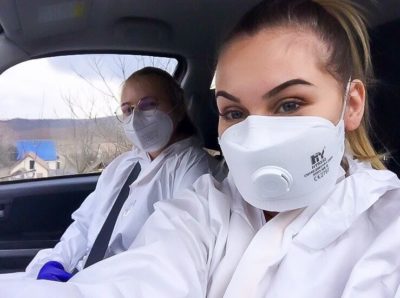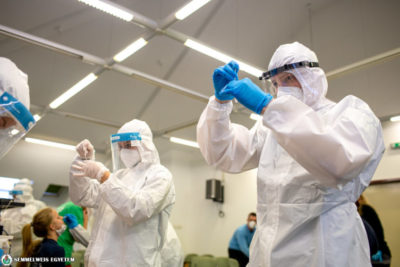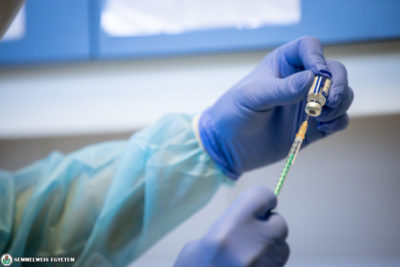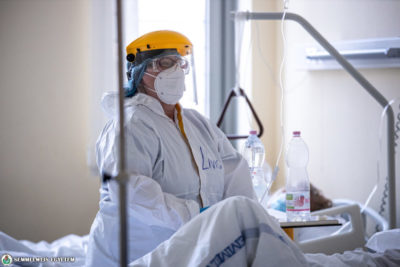During their volunteer work as part of infection control, two students of Semmelweis University performed a successful resuscitation in Rimóc, Nógrád county during PCR sampling. The patient lost consciousness before sampling, but the two students responded quickly, started chest compression immediately and notified the ambulance. Ever since the onset of the coronavirus in Hungary, more than 6,500 students of Semmelweis University have taken part in the infection control.
 Kinga Ágnes Pál, third-year student of the Faculty of Medicine and Karolina Aida Kiss, first-year student of the Faculty of Health Sciences volunteered for the national screening organized by the National Ambulance Service. As part of their assignment, they arrived in Rimóc, a village in the countryside to take a PCR sample. They even had a brief conversation with the middle-aged woman about the reason for testing, who lost consciousness right before the sample was taken. As soon as the two students noticed that her circulation stopped, they immediately started resuscitation, which they were doing alternately until the ambulances arrived, who had been notified by them on the radio. Given the suspicion of COVID infection and the use of proper protective equipment, chest compression was used.
Kinga Ágnes Pál, third-year student of the Faculty of Medicine and Karolina Aida Kiss, first-year student of the Faculty of Health Sciences volunteered for the national screening organized by the National Ambulance Service. As part of their assignment, they arrived in Rimóc, a village in the countryside to take a PCR sample. They even had a brief conversation with the middle-aged woman about the reason for testing, who lost consciousness right before the sample was taken. As soon as the two students noticed that her circulation stopped, they immediately started resuscitation, which they were doing alternately until the ambulances arrived, who had been notified by them on the radio. Given the suspicion of COVID infection and the use of proper protective equipment, chest compression was used.
“I already learned the basics of resuscitation in high school, and in the first year we also had a training in first aid at the Faculty of Medicine, but this was the first time I was able to try what I have learnt in real life. It will be an everlasting experience, especially that it was successful”, said Kinga Ágnes Pál.
Since November last year, this has been her eighth week doing PCR screenings as part of infection control. As she highlighted, she felt that she could help effectively by taking the burden off the ambulance service, In addition, she likes to communicate with people and has also gained a lot of useful experience. Kinga has wanted to be a physician since she was a child, as it has always been important for her to help others and she is also fascinated by the way the human body works. Her recent experiences have reassured her in her decision. The third-year student of the Faculty of Medicine emphasized that their case also shows that successful resuscitation depends on quick action, therefore in a similar situation, she encourages everyone else to do the same.
Karolina Aida Kiss began her studies at the midwifery training program of the Faculty of Health Sciences this year and has performed resuscitation for the first time. Since her companion, Kinga, had already participated in such training, she followed her instructions and they performed chest compressions alternately, and then assisted the ambulance team.
“Experiencing the sharp line between life and death has had a huge emotional impact on me. It is an uplifting feeling that we were in the right place at the right time and we were able to help the lady until the ambulance arrived. The love and support we received after the incident is also a great feeling”, she highlighted.
Karolina’s mother also works in health care and seeing her Karolina knew that she would not be able to work in any other field. Experiences during the epidemic have further confirmed the need for those who choose this career. Since November, the first-year student has also participated in PCR examinations coordinated by the National Ambulance Service for a total of seven to eight weeks, as well as in teacher screenings.
Over the past year, more than 6,500 Semmelweis University students have participated in infection control in addition to their studies, initially assisting with screenings at the university and then at screenings organized by the National Ambulance Service, working alongside patient beds as part of government-coordinated secondments. Now, more than 700 students have applied to work at university departments to the call published during the third wave.
Pálma Dobozi
Photo: Kinga Ágnes Pál and Karolina Aida Kiss
Translation: Katalin Illés-Romhányi


